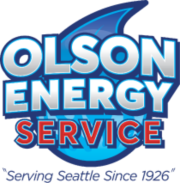-
Get the Inside Scoop on Fireplace Inserts
Even homeowners who appreciate the good qualities of fireplaces may balk at the expense of purchasing firewood and the chore of maintenance. If you want to be able to enjoy a fireplace in your Seattle home without any of the drawbacks, consider having a fireplace insert installed. When you have your insert installed by a seasoned professional, you can count on all the advantages of having a fireplace without any of the problems. Here are the answers to questions that homeowners often have about fireplace inserts.
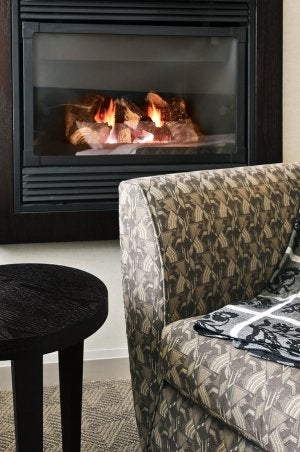
Will an insert fit in my fireplace?
This is actually the first question you should ask before making the decision to purchase an insert. It’s important to make sure that your fireplace is actually the appropriate size for an insert. Do thorough measurements of your fireplace’s height and width—including both at the front and back of the fireplace—to ensure that you don’t inadvertently buy an insert you can’t use.
What kind of fireplace insert should I buy?
You can choose between an insert that runs on wood, gas, or pellets. The type of insert you pick depends on your budget and on how you intend to use it. A wood insert is the best option if you want to replicate the look and feel of a traditional fireplace. Gas inserts can be used in tandem with your current furnace system to help curb your heating expenses. Pellets are an inexpensive option but do require a good deal of maintenance.
What kind of venting do I need for a fireplace insert?
This depends on what type of fireplace insert you have invested in. Wood and pellet inserts generally have the same type of venting as traditional fireplaces. Some types of gas inserts don’t require any venting, while others use chimney venting similar to the kind used by wood and pellet inserts. If you’re using an electrical insert, you will not need to worry about venting it at all.
-
Is Your AC Unit Leaking Refrigerant?
Your air conditioning unit needs just the right amount of refrigerant to continue to function properly—neither too much nor too little, in other words. If your AC unit is low on refrigerant, the most likely cause is a leak. If you have reason to think that there could be a leak in your AC unit, you should call an air conditioner contractor in the Seattle area so that your leak can be tracked down and repaired. These are some of the most likely signs that your AC unit may have sprung a leak.
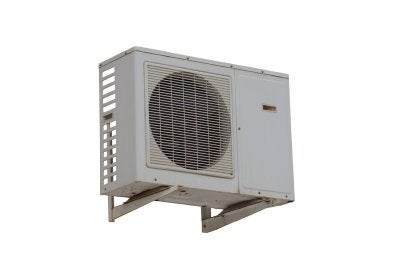
Your utility bills are unusually high. When there’s a refrigerant leak in your system, your AC unit has to run for more hours to keep your household at a comfortable temperature. You’ll see the expensive results of this when your electric bill arrives. If you want to ensure that the cost of cooling your home doesn’t get out of hand, always be quick to respond to any suspected AC leaks.
Your home isn’t staying cool. If you keep running your air conditioning and your house is still uncomfortably warm, a leak could be the culprit. When your AC is low on refrigerant, it’s much more difficult for it to effectively cool the air inside your home. If the air coming out of your registers is warm—or if there isn’t much air coming out at all—that’s another strong sign that your AC doesn’t have enough refrigerant.
There’s ice on your refrigerant lines. If there’s a refrigerant leak, the copper wire line on your outdoor AC unit can become covered with ice—even if it’s hot outside. When your AC has low refrigerant, it causes the remaining refrigerant to become too cold and cause freezing in your evaporator coil. To avoid expensive damage to your compressor, turn off your AC unit right away and call an HVAC professional.
-
Quick Tips for Improving the Performance of Your AC
When the weather starts to warm up, you’ll be grateful for having air conditioning in your Seattle home. If you aren’t careful to take the time to keep up maintenance on your air conditioner, however, you may find that it will not provide you with the level of service you deserve. Having your air conditioner routinely serviced by a maintenance professional will help to ensure that it stays efficient and effective. Here are some other steps you can take to keep your central AC system in excellent condition:
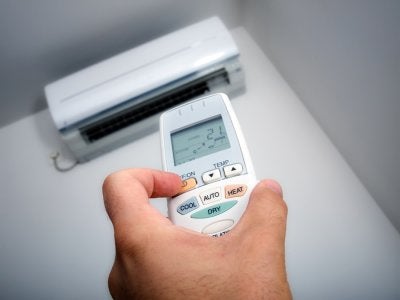
Install a ductless AC. If you simply want a certain area of your house to stay consistently cool throughout the day, you can avoid relying too much on your central AC by having a ductless mini-split system installed there. Ductless AC systems are extremely energy-efficient, and they operate unobtrusively since the compressor is located outside. Installing a ductless system may even qualify you for a federal tax credit.
Change your air filters regularly. Without a clean air filter, your air conditioner’s vents can become contaminated with dust, debris, pollen, and various pollutants. Along with harming the quality of your indoor air, this can make it harder for your air conditioner to cool efficiently as well. Check your air conditioner’s air filter regularly, and change it out for a new one when needed. During periods of heavy AC use, you’ll want to replace the filter at least once a month.
Buy a programmable thermostat. Running your air conditioner when nobody is home is wasteful, and it can also contribute to your high utility bills. If you purchase a programmable thermostat, you can schedule your AC to stop running while your house is unoccupied—or late at night, when everybody is asleep. Exercising more control over your temperature settings can help you conserve your air conditioner’s power for times when you really need it.
““
-
Our Emergency AC Repair Services in Seattle, WA
No Seattle homeowner ever wants to be left without a working air conditioner when the summer is at its hottest. That’s why it’s essential to have an air conditioning contractor you can always depend on to provide you with capable service in a crisis. At Olson Energy Service , we offer emergency HVAC service 24 hours a day, seven days a week, to customers in the Seattle area. If you’re experiencing any issues at all with your air conditioning system, our expert technicians can diagnose the problem and repair it in short order. Our team has experience responding to a wide array of HVAC problems, from failed compressors to cracked refrigerant lines. We offer preventative maintenance services to help extend the life of your AC system, and we’ll also be happy to replace your current system with a brand-new one. When you’re having trouble with your AC system, don’t hesitate to contact our team for immediate assistance.
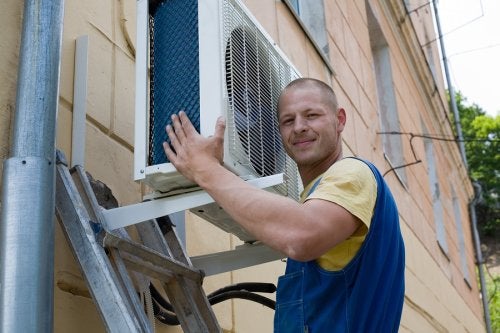
-
Should I Replace My Air Conditioner?
When the summer season arrives in Seattle, you will want to make sure that your air conditioner is ready to keep your home’s interior cool and comfortable. If your air conditioner is more than 15 years old, it could be reaching the end of its lifespan. With services from an HVAC company that specializes in air conditioning near Seattle , you will be able to replace your unit before the summer months kick into full gear. To help you decide whether it is time to set up an appointment with your HVAC contractors, here is a look at some signs that it is time to replace your air conditioner.
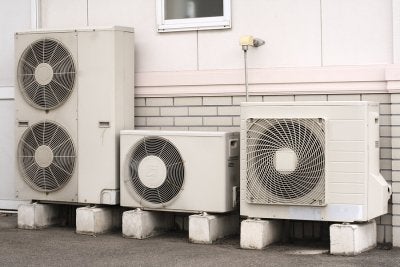
Your System Is Getting Old
Age is a primary factor to consider when you are deciding whether to replace your air conditioning unit. When you install a brand new air conditioner in your home, it will have an expected lifespan of about 15 years. Relying on the same air conditioning system for 15 years or longer could eventually lead to efficiency and maintenance problems.
You Are Facing Costly Repairs
At a certain point, the cost of repairing your old system may be more than the price of purchasing a brand new unit. If you are deciding between air conditioner repair or replacement, you can ask your HVAC technician to provide you with an estimate for the costs of your repairs. Rather than footing the bill for a major repair service, you may be better off simply purchasing a brand new unit.
You Can No Longer Purchase the Right Coolant
Older air conditioning systems typically rely on R-22 Freon, which is a special type of refrigerant. Due to the environmental impact of R-22 Freon, this type of refrigerant is harder to find and more costly to install. If your air conditioner needs to be recharged wit R-22 Freon, you may end up spending hundreds of dollars on this service. With a brand new air conditioner, you can rest assured that your system runs on a coolant that is affordable, environmentally friendly, and easy to find.
-
Understanding Common AC Efficiency Terminology
Is your air conditioner as efficient as it could be? Most Seattle homeowners may not be sure whether their air conditioning system is up to modern standards of efficiency. If you’re concerned that your bills are too high or that you are needing to run your air conditioner for long hours to keep your house cool, it may be time to contact an HVAC professional to talk about having your system replaced with a new one. If you want to better understand how air conditioner efficiency is measured, here is a guide to some of the most commonly used terms.
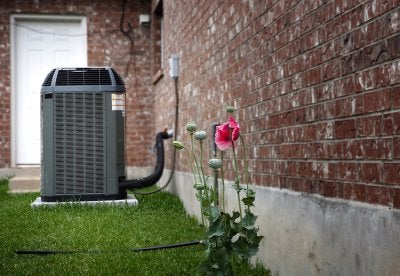
BTU. BTU is a term that stands for British Thermal Unit, and it represents the amount of heat that is required to increase the temperature of a pound of water by exactly 1 degree Fahrenheit. If you strike a single match and let it burn down, you have used up approximately 1 BTU.
Horsepower. This is a common unit of power with a number of distinct meanings. In terms of your air conditioner’s efficiency, horsepower is used to measure cooling capacity—or the amount of heat your air conditioner is able to remove from a room.
COP. COP stands for Coefficient of Performance. In terms of your HVAC system, the COP is the ratio of the amount of work you put into your system to the amount of heating or cooling you get out of it. The higher your COP is, the more reasonable your utility bills will be.
EER. EER stands for energy efficiency ratio. For the purposes of your air conditioner, it is the ratio of every BTU of energy your system uses to every watt of electrical energy it produces. The EER is used to measure the efficiency of room air conditioners, while a different ratio called the SEER—the Seasonal Energy Efficiency Ratio—is used to describe central air conditioners.
Energy Star. Energy Star is a program in the United States that certifies the most energy-efficient products on the market, helping consumers to make the best decisions for their budget and the environment. In order to be labeled with the Energy Star symbol, a product such as an air conditioner must meet the minimum requirements of the EPA.
-
How Indoor Air Quality Can Affect COPD
According to The National Heart, Lung and Blood Institute, more than 120,000 annual deaths in the United States are attributed to chronic obstructive pulmonary disease (COPD), a term used to describe a group of health conditions characterized by breathing difficulty. These include severe asthma, chronic bronchitis, and emphysema. Unfortunately, many people who have COPD do not even realize that they have it. COPD can be worsened by a number of invisible pollutants in the air inside a home, including mold spores, dust mites, chemical fumes, and pollen. The quality of your indoor air has a significant effect on your quality of life, particularly if you have COPD. If you’re concerned about your indoor air quality, a professional air duct cleaning by an HVAC company in Seattle is the perfect place to start.
““
-
What to Expect During AC Maintenance Services?
Your air conditioning needs cleaning and a checkup from time to time in order to stay in excellent condition. Professional air conditioning maintenance is the perfect way to ensure that your HVAC system is ready for the summer. An experienced technician can provide you with the services you need to enjoy fully functional air conditioning during the warm months. If you’re wondering what you can expect during a routine air conditioning maintenance visit to your Seattle home, keep reading.

Checking the outside components. The first step of air conditioning maintenance is to inspect the outdoor unit. Its accuracy will be tested, its wiring will be checked, and any dirt or debris that has gathered will be removed.
Inspecting for mold. Mold growth can be a serious health hazard anywhere in your home, but it is particularly dangerous when it happens inside your air conditioning vents, where it can contaminate the air that you breathe. An HVAC technician can check to ensure that your system hasn’t become infiltrated by mold.
Changing the air filter. If your air conditioning has been running less efficiently than usual, it may be the result of a clogged filter. During your air conditioning maintenance, your HVAC technician will usually change out your old air filter for a new one.
Checking the thermostat. Checking your thermostat is another important part of routine maintenance. If your thermostat has lost calibration over time, your HVAC technician can recalibrate it in order to ensure that it provides you with accurate temperatures.
Inspecting the system components. Your HVAC technician will also take a look at the internal components of your central air conditioning system to ensure that they’re all working properly. This includes checking the condensate drain, any moving parts, and all electrical components.
Doing a safety check. Finally, a routine maintenance service will include a safety check to make sure that your air conditioning system is safe for you to use. If there is any rust in your system, for example, your technician will remove it.
““
-
Reasons To Get a New Air Conditioning Unit This Summer
Upgrading your air conditioner serving Seattle can be a great investment , and now might be the time to pull the trigger. Your heating and cooling appliances contribute to a bulk of your energy bills, and today’s units tend to be more efficient than older models. In addition to saving you money and reducing your carbon footprint, this will make your home more comfortable and more valuable. Keep reading for more on the reasons to make this the summer you get new air conditioning.
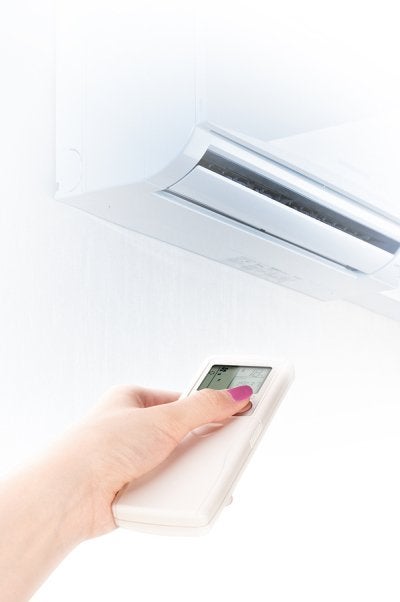
Save Energy and Money
The longer you wait to upgrade your air conditioner, the longer you’ll spend more than you have to on your energy bills. A new air conditioning installation will improve the efficiency of your home, so you can expect your energy bills to drop. If you care for your HVAC units and follow the right steps, you can even make your money back in savings over time. More efficient air conditioners require less energy, which also lessens your carbon footprint. If you’re looking for a way to go green and save some money at the same time, make this the summer you get a new air conditioner.
Stay Comfortable
Efficiency isn’t just about expending energy. Efficient heating and cooling units will also do a better job of keeping you comfortable in your home. A high quality air conditioner will cool down your living space evenly and thoroughly, and you’ll have plenty of control over the temperature. Older air conditioners tend to cool the house unevenly, do an inadequate job of keeping you comfortable, or simply fail to cool your air at all. You won’t have to worry about these issues when you upgrade to a new unit.
Make Your Home More Valuable
Even if you don’t know how long you’ll be staying at your current house, a new air conditioner still might be a worthwhile investment. A modern, high quality air conditioning system can increase the value of your home. This means you can raise your listing price, and it might be easier to find a buyer who is interested. Consider upgrading your air conditioner this summer.
““
-
Signs You Could Benefit from a New Air Conditioner
A quality air conditioner serving Seattle will help you beat the heat without breaking the bank, but how can you tell if it’s time to upgrade to a new unit? Higher energy bills often indicate a problem with the efficiency of your HVAC units, and a new air conditioner could solve the issue. Upgraded air conditioning can also make your home more comfortable and refreshing throughout the warmer months, so think about the age of your existing unit when you wonder if it’s time to make a change. Here’s a look at some signs that you could benefit from a new air conditioner.
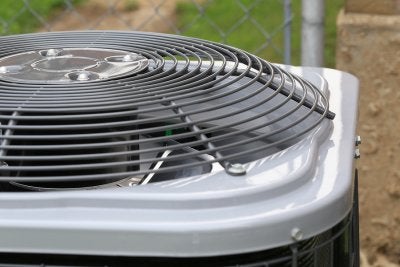
Your Bills Are Too High
An efficient air conditioner will do its job using a minimal amount of energy, and many newer models are praised for their energy savings. If you’ve been using your air conditioner with the same frequency and on the same settings as you usually would, you shouldn’t notice a spike in your energy bills due to your unit. On the other hand, a malfunctioning air conditioner can suffer a significant drop in efficiency and thus cause your energy bills to increase. When this is the case, talk to your HVAC professional and see if it’s time to upgrade.
Your Home Is Uncomfortable
What good is paying for an air conditioner that doesn’t keep your home comfortable? A faulty unit might fail to cool your home evenly, or it might not even cool your home at all. If your air conditioner no longer does it for your home, it may be time for a replacement. This is especially true if you’ve already had your unit repaired.
Your Air Conditioner Is Old
In addition to the fact that they lose efficiency over time, older air conditioners might not have started off very efficient in the first place. If your unit has been around for quite some time, you may want to explore the market and see what other units are out there. A new air conditioner may lower your energy bills and keep your home more comfortable, even if your old one wasn’t necessarily broken.
““
RECENT POSTS
categories
- Uncategorized
- Air Conditioner
- Fireplace Inserts
- Fireplace Insert Installation
- Air Conditioning Installations
- Air Conditioning Units
- Air Conditioner Maintenance
- HVAC Professionals
- Heat Pump Installation
- Heating and Cooling
- HVAC Unit
- Heat Pumps
- Furnace
- Furnace Service
- Tankless Water Heaters
- Water Heaters
- Energy Efficiency
- HVAC Contractors
- Olson Energy Service
- Mini-Split Systems
- Ductless Air Conditioner
- Residential Services
- Seasonal Boiler Maintenance
- HVAC Maintainance
